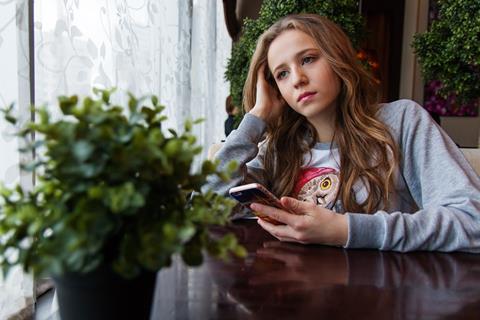Dr Deborah Webster’s PhD research confirmed what Instagram’s owners have known for some time: using social media isn’t good for teenager’s mental health. But by developing healthy habits ourselves, adults can help the young people in their lives use technology well

Whilst talking to a group of 13-year-old girls at their school, Sarah* (not her real name) shared with me how she spends several hours a day scrolling through Instagram, mostly looking at celebrities, social media influencers and her friends’ selfies and posts.
As a PhD researcher, I was interested to know how she felt this impacted her body image. Sarah* said she would avoid using certain apps if she was having ‘a bad skin day’. She and her friends talked openly about how they scrolled through other people’s bodies, hair, and clothes, comparing what they saw with their own selves. As a result, their self-esteem plummeted. They understood that these images were edited, but this didn’t change how they felt about themselves. “You can’t expect us not to have low self-esteem if we use social media!” she said. Her friend went on to tell me that, having just starting using social media, she felt lonelier now than she did before.
As Christian parents we are commanded to model and teach our children in all aspects of life… including social media
When I spoke with their teachers, they told me that they had noticed an increase in levels of anxiety within the class and that they felt this often came as a result of social media use.
Following the research
These comments should come as no surprise to the creators of social media companies. According to a leak from Facebook (who own Instagram) the firm have been studying the impact of its product on wellbeing, and found that - particularly for adolescent girls - using Instagram increases body image issues. With half of all ten years olds in the UK owning a smartphone and 87 per cent of 12 to 15-year-olds using social media apps, this is an area that parents and carers need to take notice of.
Of course, social media does have benefits for the wellbeing of young people, largely because of the connection it provides. This has become especially prevalent during recent lockdowns where many parents were thankful their teens could remain in contact with their friends. Whilst physically isolated, Instagram, TikTok, YouTube and Snapchat were a welcome replacement for break time, the classroom and the sports field. They provide a space where young people can chat, laugh and hang out together. As social beings created in the image of a relational God, social media plays a part in fulfilling our inherent desires for interaction and communion with others.
Taking action
However, Christian parents are also commanded to model and teach their children in all aspects of life: “Train up a child in the way that they should go, even when they are old they will not depart from it” (Proverbs 22:6). Technology and the internet are included in this, yet many parents lack experience in this area, and often find that their children’s’ knowledge outweighs their own.
Sarah said her self-esteem plummeted as she scrolled through other people’s bodies, hair, and clothes, comparing them to her own
We do not need to fear however, but can go forward in faith. Rather than give in to the temptation to turn a blind eye, there are some practical steps we can take to help our children navigate this digital space and establish positive relationships with their devices:
1. Talk to your child regularly about what they are doing on their devices. Ask them about the apps they are using, who they are communicating with and what they enjoy about the online games they play. It is important to keep the lines of communication open with young people, reminding them that if they come across anything they feel uncomfortable with - even if they feel it is their own fault - they can talk to us about it.
2. Develop healthy habits. Make it the norm that there are no devices used at the dinner table, whether that be in the home or when eating out - this includes the grownups too! With younger children, have a set time and place for using their devices - late afternoon is always a good time in our house as it provides some much-needed downtime when children are tired and a little bit hungry. Work hard at incorporating non-screen time activities into family life too, such as board game nights, sports, camping trips or other hobbies and interests.
3. Invest in a charging station. A charging station is basically a basket or box where devices such as phones and tablets stay at bedtime and charge overnight. Teachers are noticing that many pupils come to school tired because they are using devices in bed. Using phones and tablets late into the night disrupts sleep - which is crucial for the development of children and adolescents. By having a dedicated place for the devices to stay, they are less likely to find their way up into bedrooms at bedtime.
4. Reflect on your own behaviour. This is perhaps the most challenging part. There is, of course, a lot of truth in the saying that children copy what they see. We may need to reflect on our own relationship our mobile phones - I know I certainly do!

































